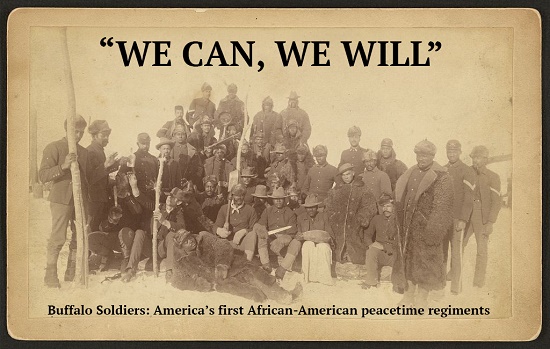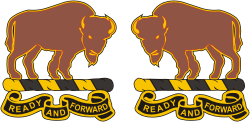Buffalo Soldiers: An American Legacy

"We Negroes had little, at the turn of the century, to help sustain our faith in ourselves except the pride that we took in the 9th and 10th Cavalry, the 24th and 25th Infantry."
– Rayford W. Logan, American scholar and historian
African American soldiers have fought in every conflict, including the American Revolution and the War of 1812, often without due or recognition. African American soldiers also fought as volunteers during the Civil War when they were known as the U.S. Colored Troops. It was after the Civil War that they adopted the nickname of Buffalo Soldiers – and their history within the U.S. Army runs deep.
A Shift in History
According to the National Park Service, more than 180,000 African American soldiers fought during the Civil War. At its conclusion, the United States continued driving westward. With the expansion into new territory came a multitude of challenges and dangers, including hazardous terrain and resistance from native tribes. American military regiments at the time were tasked with providing a protective force in unknown territory.
Among the troops assigned these perilous duties were those of the 9th and 10th Cavalry and the 24th and 25th Infantry. These Army regiments – comprised solely of African American service men – earned the now legendary nickname of Buffalo Soldiers. They wore the moniker with pride, and the name encompassed all-black units in the Army until the military was desegregated after WWII.
“Native populations and African American soldiers gained respect for one another in the sense that they recognized they were all fighting to be free,” said Edna Wagner, executive director of the Richard Allen Cultural Center and Museum near Fort Leavenworth, Kansas. “The name Buffalo Soldiers is a sign of respect. The Buffalo Soldiers were seen as fierce and strong.”
Often, these four regiments worked and fought side-by-side, and together they helped craft and protect the settlement of the Southwest and Great Plains areas. While doing so, they carved a significant niche in American history.
"Let the Black man get upon his person the brass letters U.S., let him get an eagle on his button, and a musket on his shoulder and bullets in his pockets, and there is no power on earth which can deny that he has earned the right of citizenship in the United States." – Frederick Douglass, social reformer
A Nickname Becomes a Badge of Honor
The Buffalo Soldiers spent more than 20 years helping the nation expand west. These troops provided security for settler convoys, guarded post carriers, and built roads. They also regularly engaged in battle with Native American tribes, including Apache, Kiowa, Cheyenne, and Comanche. During peacetime, Buffalo Soldier units also served as U.S. Park Rangers in Yosemite, Sequoia, and General Grant National Parks.
Some have credited the Comanche with coining the term, while others say it was the Cheyenne. There are accounts that claim the term was used to describe the fierce fighting tenacity of the troops, while different ones state the name stemmed from physical attributes. And others say it could have been a combination of the two.

While the history remains unclear about the origins of the nickname Buffalo Soldiers, what’s apparent is that the group’s mystique and valor have survived the onward march of history.
The regiments accepted the nickname with honor. The 10th Cavalry Regiment even had a buffalo on their coats of arms. The label became associated with every Army unit that could trace its roots back to the four original regiments of Buffalo Soldiers.
Achievement in Face of Adversity
The 9th and 10th Cavalry Regiments operated under mottos that were as succinct as they were impactful: “We Can, We Will” (9th) and “Ready and Forward” (10th). Though the Buffalo Soldiers endured hardships and discrimination – often at the hands of those they were tasked with protecting – they reached many notable accomplishments.
They were involved in campaigns that led to the capture of prominent figures such as Geronimo and Pancho Villa. Following the end of the American Indian Wars, they went on to fight in the Spanish-American War, the Philippine-American War, and both world wars. Through these engagements, the Buffalo Soldiers earned many Congressional Medals of Honor.
When the nation’s social climate began to change, President Harry Truman issued an executive order to end racial segregation in the military. By the mid-1950s, the remaining all-black units were officially disbanded. The last of the Buffalo Soldiers, Mark Matthews, died in 2005 at age 111. Although the living remnants have gone, the accomplishments of these first African American units will stay alive in the history pages of the country they helped establish.
Distinguished Buffalo Soldier Accolades
- Cathay Williams is the only known Black female soldier who was part of the Buffalo Soldiers.
- The 9th Regiment received 15 Medals of Honor for actions between 1870 and 1890.
- Sgt. Emanuel Stance was the first black Medal of Honor recipient in 1870
- Henry Vinton Plummer was the first black regular Army chaplain.
- Benjamin O. Davis Sr. served with the regiment as an enlisted man and received his commission in 1901. In 1940 Davis became the first African American promoted to General in the U.S. Army.
- Lt. Henry Flipper was the first black graduate of the U.S. Military Academy (1877).
- Sgt. Major Edward L. Baker received the Medal of Honor for rescuing a wounded comrade under fire during the Cuban campaign in 1898.
- Cpl. William Thompkins, and Privates Dennis Bell, Fitz Lee, and George Wanton received the medal for bravery in an amphibious operation on the south shore of Cuba.
Sites Highlighting the Role of Buffalo Soldiers
- Fort Leavenworth – In 1992, U.S. Army Gen. Colin Powell dedicated the Buffalo Soldier Monument at Fort Leavenworth, Kansas, to commemorate the 10th Cavalry Buffalo Soldiers who were founded here.
- Fort Sill National Historic Landmark and Museum – Three miles north of Lawton, Oklahoma, the original structures were built by the 10th Cavalry Buffalo Soldiers.
- Fort Concho National Historic Landmark – Located in San Angelo, Texas, it was home to Buffalo Soldiers between 1869 and 1885. Although the post was deactivated in 1889, 24 original and restored structures are on site.
- Fort Selden National Historic Site – This U.S. military outpost north of Las Cruces, New Mexico, was abandoned in 1891. The historic site, reestablished in the 1970s, includes Buffalo Soldier, Native American, and Latino heritage. The site is connected to El Camino Real.
- Camp Naco and Fort Huachuca – These sites, in the Tucson, Arizona, area and further south, close to the border with Mexico, bore witness to the struggle to secure borders and to the fusion of cultures in the Southwestern U.S. Most of the remaining historical buildings were made of adobe.
- Presidio of San Francisco – During the 1898 Spanish American War, thousands of U.S. troops camped at the Presidio while awaiting deployment to the Philippines, including all four Buffalo Soldier regiments. The site has more than 350 buildings of historical significance. It is operated by the National Park Service.
Pages to Learn More
- Buffalo Soldiers Museum - https://buffalosoldiersmuseum.org/
- National Park Service - https://www.nps.gov/subjects/buffalosoldiers/index.htm
- Wounded Warrior Project - 9 Facts About the Buffalo Soldiers
Wounded Warrior Project® (WWP) salutes the spirit, camaraderie, and accomplishments of these first African American units, just as we do for our modern-day service heroes. Buffalo Soldiers exemplified the sense of duty and country, which is something still found in today’s warriors served by WWP.
Contact: Raquel Rivas – Public Relations, rrivas@woundedwarriorproject.org, 904.426.9783. Original research by Lazjeé Lyles.
About Wounded Warrior Project
Since 2003, Wounded Warrior Project® (WWP) has been meeting the growing needs of warriors, their families, and caregivers — helping them achieve their highest ambition. Learn more.